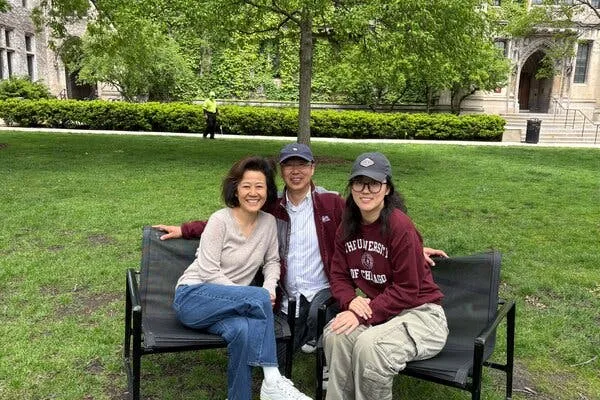Chinese Students Rattled by Trump’s ‘Aggressive’ Visa Ban Plans
In recent weeks, the Trump administration’s plans to ruthlessly revoke visas for thousands of Chinese students have sent tremors through a community that has played a significant role in the American education system. Once considered valuable assets, many of these students now feel targeted and vulnerable amid rising tensions between the two nations.
Background of the Situation
The proposed visa restrictions come during a period of heightened scrutiny aimed at China, driven by geopolitical tensions, trade wars, and national security concerns. The Trump administration has branded the proposal as an effort to bring immigration policies in line with a broader ‘America First’ strategy. This campaign promises to prioritize the interests of American citizens, which many argue comes at the expense of foreign students, especially those from China.
The Impact of the New Visa Policies
According to the Institute of International Education (IIE), there are approximately 370,000 Chinese students enrolled in U.S. colleges and universities, making up the largest demographic of international students in the country. These students contribute an estimated $14 billion annually to the U.S. economy through tuition, living expenses, and other expenditures. However, the proposed visa alterations threaten both their educational pursuits and future employment opportunities in the U.S.
Voices of the Students
Many Chinese students have expressed deep concern over the proposed measures. Li Wei, a master’s candidate at a top-tier university in California, recounted the emotional turmoil: “I came here to realize my dreams, to learn and contribute to this society. Now, I feel like a criminal in someone else’s country, constantly fearing that my visa may be revoked without warning. It is utterly devastating.”
This sentiment is echoed by Xie Fang, an undergraduate student who added, “We are not here to steal jobs or spy for the government; we are here to learn, grow, and ultimately contribute to the world. It feels like we are being unfairly punished for the problems between our countries.”
The Wider Implications of Visa Restriction Policies
While the administration argues that the aggressive visa revocation plan is necessary to address legitimate concerns regarding espionage and national security, critics claim that it overlooks the significant net benefits that international students bring to the academic and cultural fabric of American society. Experts warn that these policies could drive away potential foreign talent and lead to a more insular academic environment.
Dr. Emily C. Meyer, a professor of sociology at Stanford University, stated, “The idea that foreign students are a threat creates a dangerous narrative. These students not only challenge our intellect but also enrich our campuses through diverse perspectives, backgrounds, and experiences. If these policies materialize, we risk narrowing the very essence of what American higher education stands for: inclusivity and excellence.”
Economic Repercussions
The current economic climate also raises alarms about the implications of the administration’s stance on Chinese students. Universities across the country are already bracing for potential losses. A study by the American Association of Colleges and Universities (AACU) indicated that institutions that rely heavily on international tuition fees could face budget shortfalls leading to cuts in programs, faculty, and services for all students.
Moreover, a decline in Chinese enrollment may ripple into various sectors beyond education, affecting housing markets, local businesses, and the broader economy. The real estate industry, especially in college towns, could face a downturn as fewer international students necessitate less housing.
Diplomatic Responses and Concerns
While the Trump administration insists that measures will safeguard U.S. interests, the Chinese government has responded with strong pushback. Chinese officials have raised concerns over the safety and treatment of their students in the U.S., calling the proposed policies discriminatory. Many worry that diplomatic ties could further deteriorate, leading to retaliation that could inadvertently affect U.S. students studying in China.
Moreover, as tensions simmer, both countries have engaged in a tit-for-tat approach, with similar visa restrictions becoming a weapon in broader geopolitical maneuvers. The potential barriers to academic collaboration spark fear that such policies could stagnate scientific innovation and other cross-cultural opportunities.
Looking Ahead: A Call for Cooperation
As the dust settles from the initial reactions to the proposed visa bans, it is essential to foster an environment where dialogue can take precedence over hostility. Educational institutions, policymakers, and community stakeholders must recognize the urgent need for a comprehensive approach that balances national security concerns with the pursuit of educational and cultural exchange.
Building bridges rather than walls may seem idealistic, but recent studies suggest that international collaboration in research and innovation yields unprecedented results. Dr. Linda Chen, a researcher and advocate for international academic relations, emphasizes, “Our greatest assets lie in our ability to work together across borders—our students, scholars, and scientists can address the global challenges we face today more effectively when they collaborate beyond geographical limitations.”
The Student Community’s Response
In response to the uncertainty surrounding their futures, numerous student organizations have mobilized around campus to raise awareness and advocate for policies that promote inclusivity in education. From organizing forums to create open dialogues with university administrations, to pushing for public campaigns that highlight the positive contributions of international students, these groups are determined not to be silenced.
Moreover, alumni from U.S. institutions who have returned to China find themselves in a unique position. Many have expressed a desire to reinforce the bonds that tie their two countries together through education. Xuan Zhang, a graduate from an Ivy League school, commented, “It’s vital for my generation to continue seeking dialogues and collaborations even amid political tensions. We need to ensure future generations can benefit from the same opportunities we have.”
Final Reflections
As the political landscape continues to shift, it is critical to recognize the human side of immigration and education policies. The apprehension felt by Chinese students in America reflects a broader trend of fear that permeates the global landscape in times of uncertainty.
Among the swirling uncertainties caused by the proposed visa ban, the resilience of students embodies hope and underscores the benefits of a globalized educational environment. Whether or not the administration’s aggressive stance will soften remains to be seen, but one thing is clear: the future of American higher education thrives on inclusivity, innovation, and the ability to embrace diverse perspectives from around the globe.







